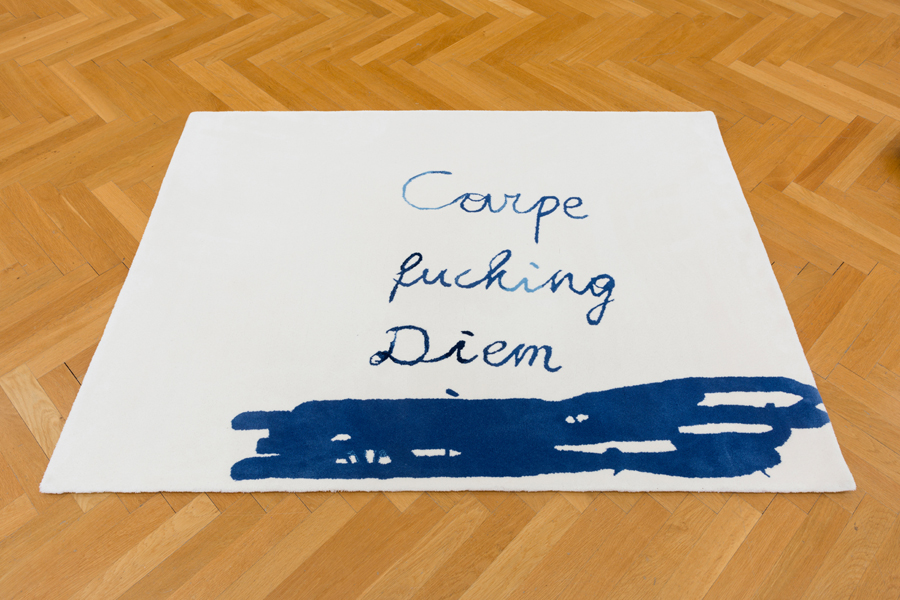Verena Dengler
Kunsthalle Bern, Switzerland
Kunsthalle Bern, Switzerland

At the moment, anyone who talks about Verena Dengler is obliged to mention her all-female fraternity, Hysteria. Founded in 2016 by a group of Vienna-based, politically-minded creatives, Hysteria proclaimed a matriarchy, adopted the testosterone-drenched customs of ultra-conservative and extreme right-wing fraternities and, through media omnipresence, began to antagonize the very factions of Austria’s cultural and political sectors whose mechanisms they were imitating.

A large room of Dengler’s exhibition ‘Jackie of All Trades & Her Radical Chic Academy with (((HC Playner)))’ takes Hysteria as its central subject. Under the pseudonym HC Playner (an allusion to the far-right politician and frat boy Heinz-Christian Strache), Dengler positions various pencil portraits of her ‘fraternity brothers’ alongside taxidermied versions of the collective’s heraldic beast, the hyena. In front of one is a pile of New Balance trainers, heaped as if their neo-Nazi wearers have been eaten alive (Turn a Deaf Ear to Shoes for White People, all works 2017). This equating of patriarchy and right-wing extremism reflects certain conditions specific to Austria, where far-right politicians, like Marcus Franz, argue that a butt-grab is a form of appraisal. But even without an understanding of this political situation, Hysteria’s defiling of frat-codes is greatly entertaining. Shattered Urinal from the Former Fritz-Stüber-Heim in Vienna, for instance, sees a urinal appropriated from the collective’s headquarters, the former home of an extreme right-wing group, and reduced to shards. In one fell swoop, the work smashes a right-wing relic, a trope of competing masculinities, and the artistic prerogative of removing an object from its original context – epitomized by the high jinks of Duchamp.

The remainder of the show, attributed to Dengler herself, deals with socially-defined gender roles, most strikingly in Regretting Motherhood II, an assemblage of shopping bags from luxury children’s brands like Karl Lagerfeld Kids and Junior Gaultier. The mother’s weak emotional connection to the infant in question (as indicated in the work’s title) is crossed with a numbing consumerism – the child as status symbol dressed up in further empty demarcations of social standing. The painting Bussi, Mama! approaches the mother-child relationship from a more personal angle. Against a pastel background, Dengler has scrawled a brutal but loving message that she received from her mother on her 15th birthday – one that would destroy the teen’s dreams of pop stardom: ‘There are no unrecognized geniuses [...] Kiss, Mom.’ This vulnerability breathes through another series, dedicated to the artist’s recently-deceased father. With genuine sincerity, her father’s work as a software developer is lovingly recapped from Dengler’s viewpoint. In Special Retirement Magazine, for example, the artist reproduces on metal plates the pages of a nerdy farewell newspaper that was made by her father for a departing colleague.

This juxtaposition of disparate positions (most palpably Playner’s aggro-feminism and the artist’s familial reminiscing) is the most successful aspect of the show. It is, however, matched by something else: Dengler is a fantastic painter! The exhibition’s pervading muzak of politicized anger floats through these works, but now it is formulated, without the exaggerated aggression that drives Hysteria as a collective. The Nutwork spreads out a complex visual universe of leftist political slogans and pop-culture figures, among them the monocle-clad ‘Austerity Nut’ (a relative of Mr Peanut), who axes the social safety net. While these paintings recall those of Sergej Jensen and Michel Majerus, Dengler politically reroutes the formal vocabulary of these male artists and populates the works with emblems of the ‘feminine’– the crafted, ornamental and domestic. For example: a wool, embroidered cloth is sewn onto the aforementioned canvas. Here, however, its colours match those of Friedensreich Hundertwasser’s The Road to Socialism (1982). This irony-laden backdrop of aestheticized, form-centric male painting, when laced with such political snark, comes off as a slap in the face. But boys, don’t take it as an insult, this is how appraisals work at the Radical Chic Academy.
Main image: Verena Dengler, ‘Jackie of All Trades & Her Radical Chic Academy mit (((HC Playner)))’, 2017, Kunsthalle Bern. Courtesy: Kunsthalle Bern; photograph: Gunnar Meier
























